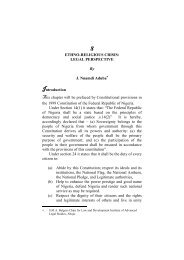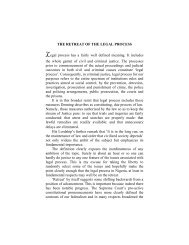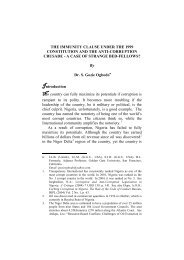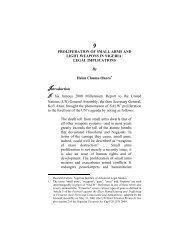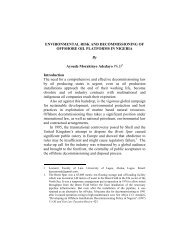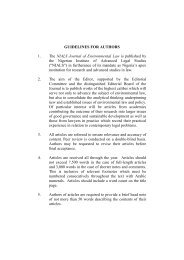DEVELOPMENT OF PLEA BARGAINING IN THE ADMINISTRATION ...
DEVELOPMENT OF PLEA BARGAINING IN THE ADMINISTRATION ...
DEVELOPMENT OF PLEA BARGAINING IN THE ADMINISTRATION ...
Create successful ePaper yourself
Turn your PDF publications into a flip-book with our unique Google optimized e-Paper software.
58<br />
NIALS Journal of Law and Development<br />
unworkable as a routine depictive procedure. A variety of<br />
factors, some quite fortuitous, inclined caseload into contrail<br />
plea bargaining procedure rather than to refine its trial<br />
procedure as contemporary legal system was doing.<br />
Plea bargaining was unknown during most of history of<br />
the common law. 28 Only in the nineteenth century we found<br />
significant evidence of the practice in either England or<br />
America. These findings beckon to legal historian for<br />
explanation. In modern time, plea bargaining has become the<br />
primary procedure through which we dispose of the vast<br />
proportion of cases of serious crimes. How then could<br />
common law procedure function for so many centuries with<br />
practice that is today so prevalent and seemingly so<br />
indispensable?<br />
The Nature of Plea Bargain<br />
Let us reiterate here once again, though at the expense of<br />
repetition that there are two basic types of plea bargain viz:<br />
Charge bargain and sentence bargain. In the case of charge<br />
bargain, it is arranged in a way that the prosecutor takes out a<br />
less serious offence charge which carries a consequent less<br />
punishment than what would have been obtainable if the<br />
original charge were preferred and the accused successfully<br />
prosecuted. In this case, the accused person must have<br />
pleaded guilty to one or more charges, depending on the<br />
bargain. The second type of plea bargain is sentence bargain.<br />
In this case, the charges or counts need not be more than one.<br />
It may be a single charge or count. Here the accused person<br />
agrees to plead guilty to the charge in exchange for the<br />
prosecution agreeing to a minimal punishment. Under<br />
sentence bargain, it is necessary that the offence in question<br />
must carry alternative punishments. If the offence carries a<br />
28. Beatie, J. M. (1977): ‘ Crime and Courts in Surrey: 1736-1753”, in J. S.<br />
Cocburn (ed):



